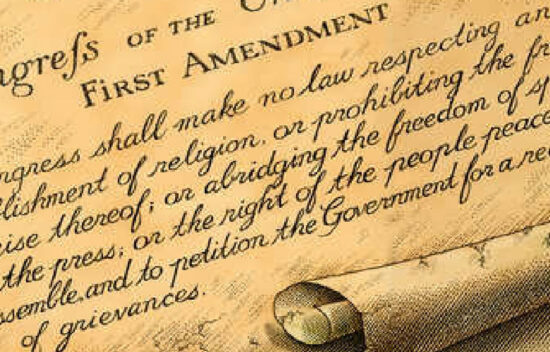First Amendment Concerns over Judicial Security Bill Continue
The Senate has recently included a judicial security bill, S. 2340, in the defense appropriations bill called NDAA that must pass before Congress adjourns for the Christmas holiday.
Judicial security is something we take with the utmost seriousness. Fix the Court has long supported increases in funding to the Supreme Court Police and the division of the U.S. Marshals Service that protects federal judges and justices. We’ve also called for free, modernized home threat detection systems for all judges and justices, and we’ve applauded the judiciary for conducting new trainings for staff, including judges, on threat detection.
What’s a bit strange, though, is that beyond the initiatives described the above the judiciary has successfully included a blatantly unconstitutional provision in S. 2340 that would effectively censor truthful information about public officials.
So, if the bill is enacted, and someone posts any type of information under a dozen different broad categories of “covered information” (Sect. 3(2)) online about a judge, that judge can send in a request to take it down. If the poster doesn’t comply, the judge can sue poster, and if he loses, he must pay the judge’s legal fees (and unpost the information).
The info that’s included under this provision: a judge’s date of birth, whether they have children, and where their spouse works. It’s overly broad, and such breadth does not further a government interest.
To quote the Cato Institute’s Thomas Berry: “The bill would thus allow significant government censorship of truthful speech about federal judges.”
Two additional points: a bill with similar provisions was enjoined in federal court in 2017, and when the state of New Jersey was contemplating this issue in 2020, they went with a much narrower definition of “covered information” — simply a judge’s social security, credit card, driver’s license and unlisted telephone numbers and home address.
FTC urges the Senate to rethink the inclusion of S. 2340 in the NDAA and to write a judicial security bill that will keep our judges safe without instigating a spate of First Amendment lawsuits.
Groups opposing or having major concerns with the judicial security bill’s inclusion in NDAA:

— Oct. 20, 2022: Reporters Committee for Freedom of the Press post: LINK
— Oct. 19, 2022: Center for Democracy and Technology tweet thread: LINK
— Oct. 17, 2022: Free Law Project’s opposition to parts of S. 2340: LINK
— Oct. 17, 2022: Cato Institute blog post updating the earlier op-ed: LINK
— Oct. 17, 2022: Fix the Court tweet thread: LINK
General concern over First Amendment implications of judiciary security bill:
— Dec. 26, 2021: Cato Institute op-ed in the Wall Street Journal on why the government shouldn’t be in the business of censoring truthful speech about judges, which is what this bill would do: LINK
— Apr. 14, 2021: Fix the Court op-ed in Just Security on how the bill threatens judicial accountability: LINK
— Nov. 12, 2020: Fix the Court post on how the negative provisions of the bill overshadow the positive that much of it could do: LINK